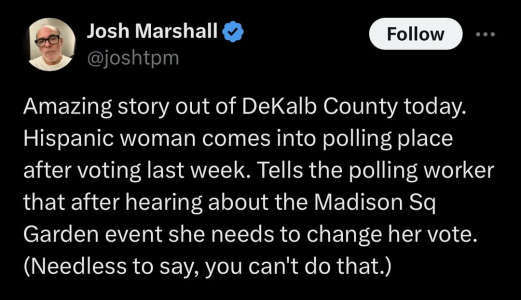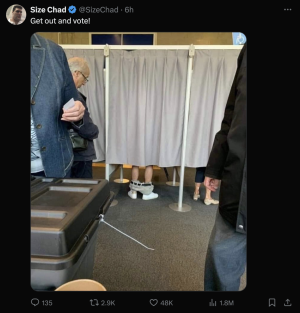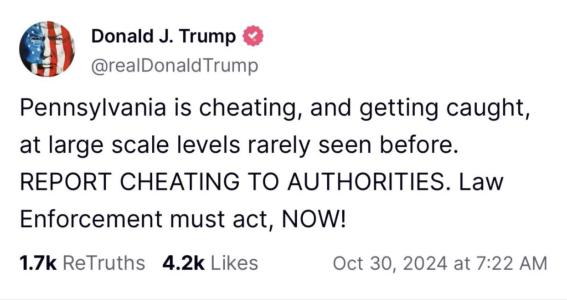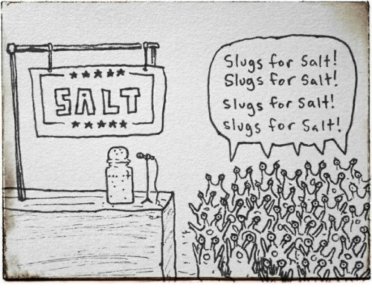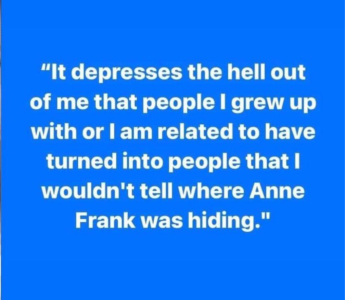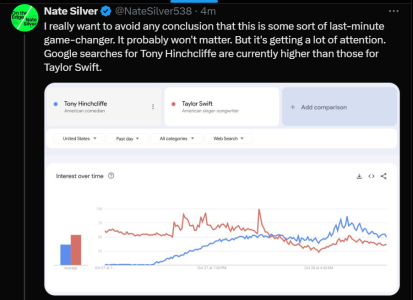The crisis isn’t too much polarization. It’s too little democracy.
If Republicans couldn’t win so much power while losing votes, the US wouldn’t be in the current crisis.
By
Ezra Klein@ezraklein Nov 12, 2020, 11:40am EST
Imagine that, four years ago, Donald Trump lost the presidential election by 2.9 million votes, but there was no Electoral College to weight the results in his favor. In January 2017, Hillary Clinton was inaugurated as president, and the Trumpist faction of the GOP was blamed for blowing an election Republicans could’ve won.
The GOP would have been locked out of presidential power for three straight terms, after winning the crucial popular vote only once since 1988. It might have lost the Supreme Court, too.
And so Republicans would likely have done what Democrats did in 1992, after they lost three straight presidential elections: Reform their agenda and their messaging, and try to build a broader coalition, one capable of winning power by winning votes. This is the way democracy disciplines political parties: Parties want to win, and to do so, they need to listen to the public. But that’s only true for one of our political parties.
Take the most recent election. Joe Biden is on track to beat Donald Trump by around 5 million votes. But as my colleague Andrew Prokop
notes, a roughly 50,000-vote swing in Arizona, Georgia, and Wisconsin would’ve created a 269-269 tie in the Electoral College, tossing the election to the state delegations in the House, where Trump would’ve won because Republicans control more states, though not more seats. Trump didn’t almost win reelection because of polarization. He almost won reelection because of the Electoral College.
The Senate tells a similar story. It is likely, when the votes are counted, that Democrats will have won more Senate votes in each of the last three Senate cycles, but never controlled the Senate in that time. Vox’s Ian Millhiser calculates that if Senate Democrats lose the two
Georgia runoffs, they will still, in the minority, represent 20 million more people than the Republican Senate majority.
I wrote
a book on political polarization, so I’ve gotten the same question over and over again in the past week: What are we going to do about all this polarization?
America’s problem right now isn’t a surfeit of political polarization. It’s a dearth of democracy. The fundamental feedback loop of politics — parties compete for public support, and if they fail the public, they are electorally punished, and so they change — is broken. But it’s only broken for the Republican Party.
The asymmetry of the American political system
The simplest way to understand American politics right now is that we have a two-party system set up to create a center-left political coalition and far-right political coalition.
Two reinforcing features of our political system have converged to create that result. First, the system weights the votes of small states and rural areas more heavily. Second, elections are administered, and House districts drawn, by partisan politicians.
Over the past few decades, our politics have become
sharply divided by density, with Democrats dominating cities and Republicans dominating rural areas. That’s given Republicans an electoral advantage, which they’ve in turn used to stack electoral rules in their favor through aggressive gerrymandering, favorable Supreme Court decisions, and more. As a result, Democrats and Republicans are operating in what are, functionally, different electoral systems, with very different incentives.
To reliably win the Electoral College, Democrats need to win the popular vote by 3 or 4 percentage points. To reliably win the Senate, they need to run 6 to 7 points ahead of Republicans. To reliably win the House, they need to win the vote by 3 or 4 points. As such, Democrats need to consciously strategize to appeal to voters who do not naturally agree with them. That’s how they ended up with Joe Biden as their nominee. Biden was not the choice of the party’s more ideological base. He was not the choice of those who wanted to see Democrats reflect the young, multiethnic, majority-female voters driving their electoral victories.
Biden was the choice of Democrats who favored
electability above all. Electability is a weird idea: It asks not that you vote for who you find most electable, but for who you think a voter who is not like you would find most electable.
Biden promised that he could lure back some of the white, working-class voters who’d powered Trump’s 2016 victory, and he could do it explicitly because he was an old, moderate, white guy who could talk to the parts of the electorate that feared the ideological and demographic changes sweeping the nation. Democrats bought that pitch, and Biden, to his credit, delivered on it. The Democratic Party is led by a center-left leader because that’s what it believed it needed in order to win. And winning
mattered above all else.
For Republicans, the incentives are exactly the reverse. They can win the presidency despite getting fewer votes. They can win the Senate despite getting fewer votes. They can win the House despite getting fewer votes. They can control the balance of state legislatures despite getting fewer votes.
And so they do. Their base, like the Democratic base, would prefer to run more uncompromising candidates, and their donors would prefer a more uncompromising agenda. A party that needed to win a majority of the popular vote couldn’t indulge itself by nominating Trump and backing his erratic, outrageous, and incompetent style of governance to the hilt. A party that needed a majority of the popular vote to win the Senate and the House couldn’t keep trying to rip health care away from tens of millions of people while cutting taxes on the richest Americans.
Republicans are not irrational for spending down their electoral advantage on more temperamentally extreme candidates and ideologically pure policies. The process of disappointing your own base is brutally hard — just look at the endless fights between moderates and leftists on the Democratic side. What motivates parties to change, compromise, and adapt is the pain of loss, and the fear of future losses. If a party is protected from that pain, the incentive to listen to the public and moderate its candidates or alter its agenda wanes.
An argument I make at some length in my book is that polarization is not, in and of itself, a good or a bad thing. What matters is the way it interacts with the broader political system: how elections are won, how legislation is passed, how disagreement is resolved. At the simplest level, higher levels of polarization will make parties more desperate to win, which in turn will push them to adapt the strategies needed to win in the system they inhabit.
But our electoral system is imbalanced, and it’s led to imbalanced parties: It forces Democrats to lean into the messy, pluralistic work of winning elections in a democracy, and allows Republicans to avoid that work, and instead worry about pleasing the most fervent members of their own base. It forces Democrats to win voters ranging from the far left to the center right, but Republicans can win with only right-of-center votes.
America needs a better Republican Party. But it won’t get one under this system.
And that is how we come to the situation we face today: A party that adapts to anti-democratic rules will quickly become a party that fears democracy. A party that knows it can’t win a majority of the vote will try to make it difficult for majorities to vote, and have those votes count. A party that isn’t punished for betraying the public trust will keep betraying it.
If Republicans were more worried about winning back some of Biden’s voters rather than placating Trump’s base, they wouldn’t be indulging his post-election tantrum. It would be offensive to the voters they’re losing, and who they’ll need in the future. But they’re not, and so they have aligned themselves with Trump’s claims of theft — with profoundly dangerous consequences for America.
Trump is not in the White House, refusing to accept the results of the election, because America is polarized. He is there because of the Electoral College. Mitch McConnell is not favored to remain Senate majority leader because America is polarized. He is favored to remain Senate majority leader because the Senate is the most undemocratic legislative chamber in the Western world, and the only way Republicans seem to lose control is to lose successive landslide elections, as happened in 2006 and 2008.
In politics, as in any competition, the teams adopt the strategies the rules demand. America’s political parties are adopting the strategies that their very different electoral positions demand. That has made the Democratic Party a big-tent, center-left coalition that puts an emphasis on pluralistic outreach. And it has let the Republican Party adopt more extreme candidates, dangerous strategies, and unpopular agendas, because it can win most elections even while it’s losing most voters.





















